It has been an eventful few weeks for staff and students at Brighton University. The senior management team is insisting on steamrolling 140 redundancies through to save £18m. This is despite students, staff, community groups, academics, and trade unions informing them en masse of the dire consequences these cuts to staffing will have on education.
The cuts will have repercussions beyond students and faculty at Brighton University. We’re already seeing other university’s senior management teams tabling redundancies. However, students and staff at Brighton have refused to back down.
Rallying for Brighton University
On Saturday 10 June, the University and College Union (UCU) organised a protest and rally. We began our march at the Level, then proceeded through the Laines up to the train station:
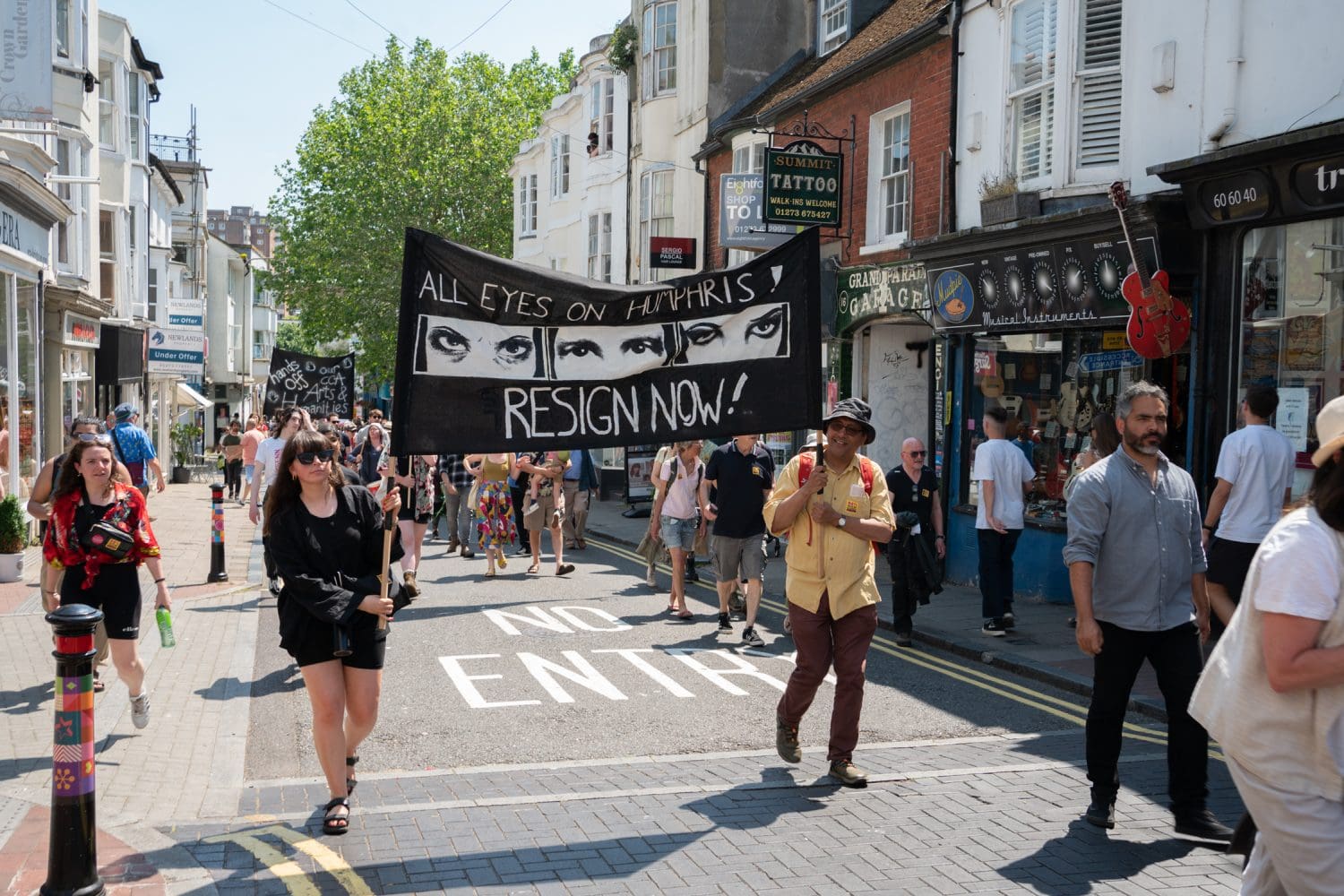
We then marched through the city centre:
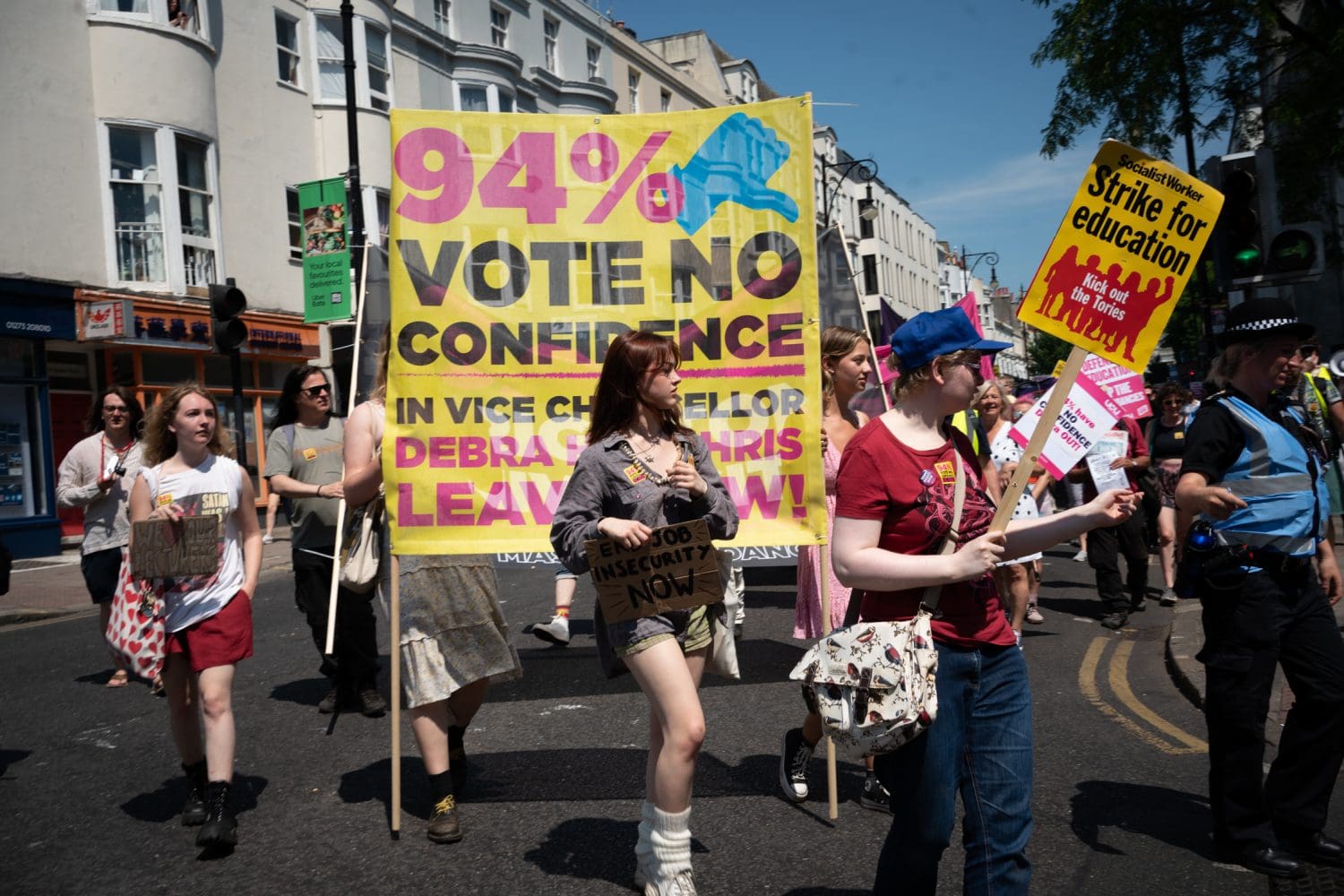
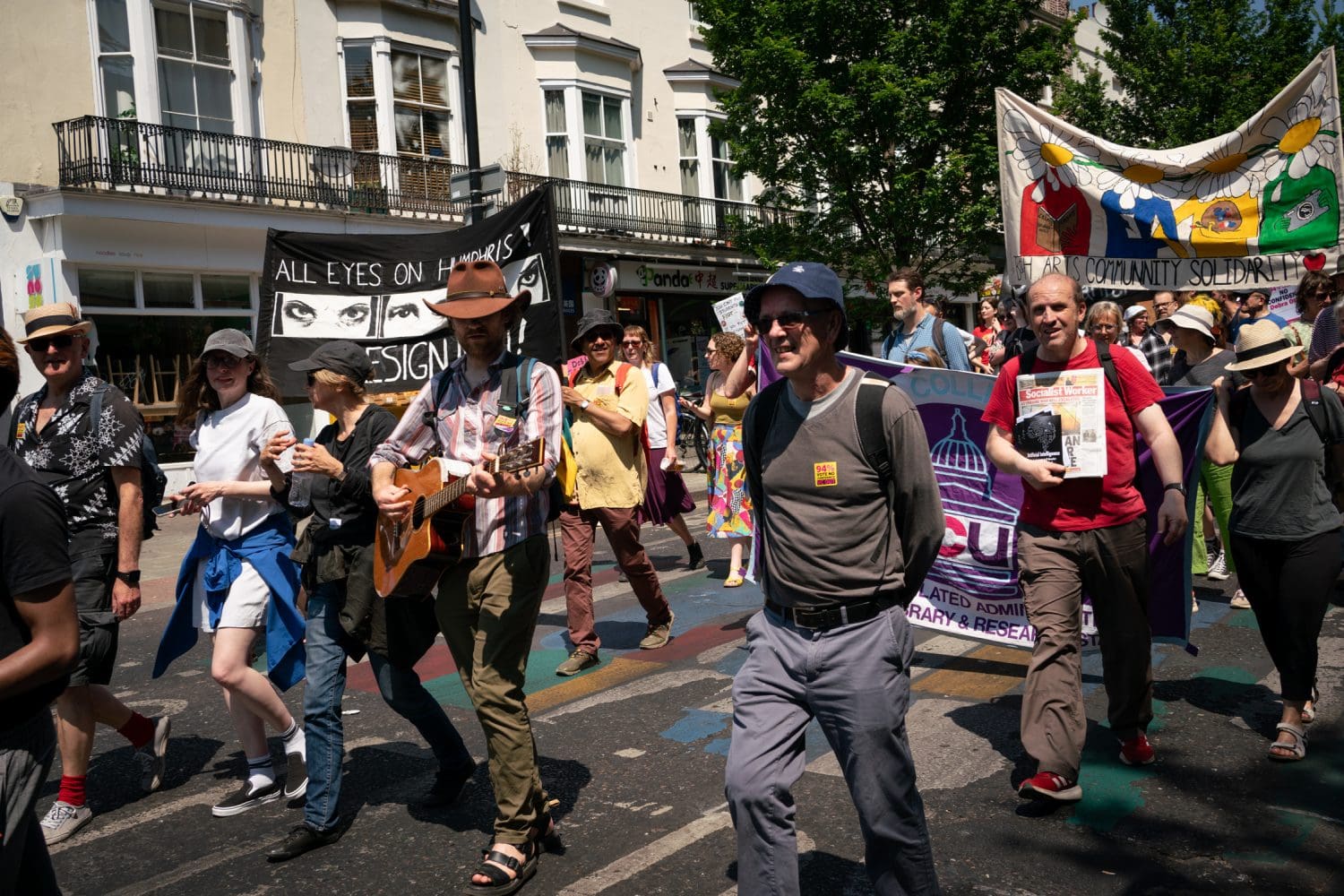
The rally finished at Victoria Gardens:
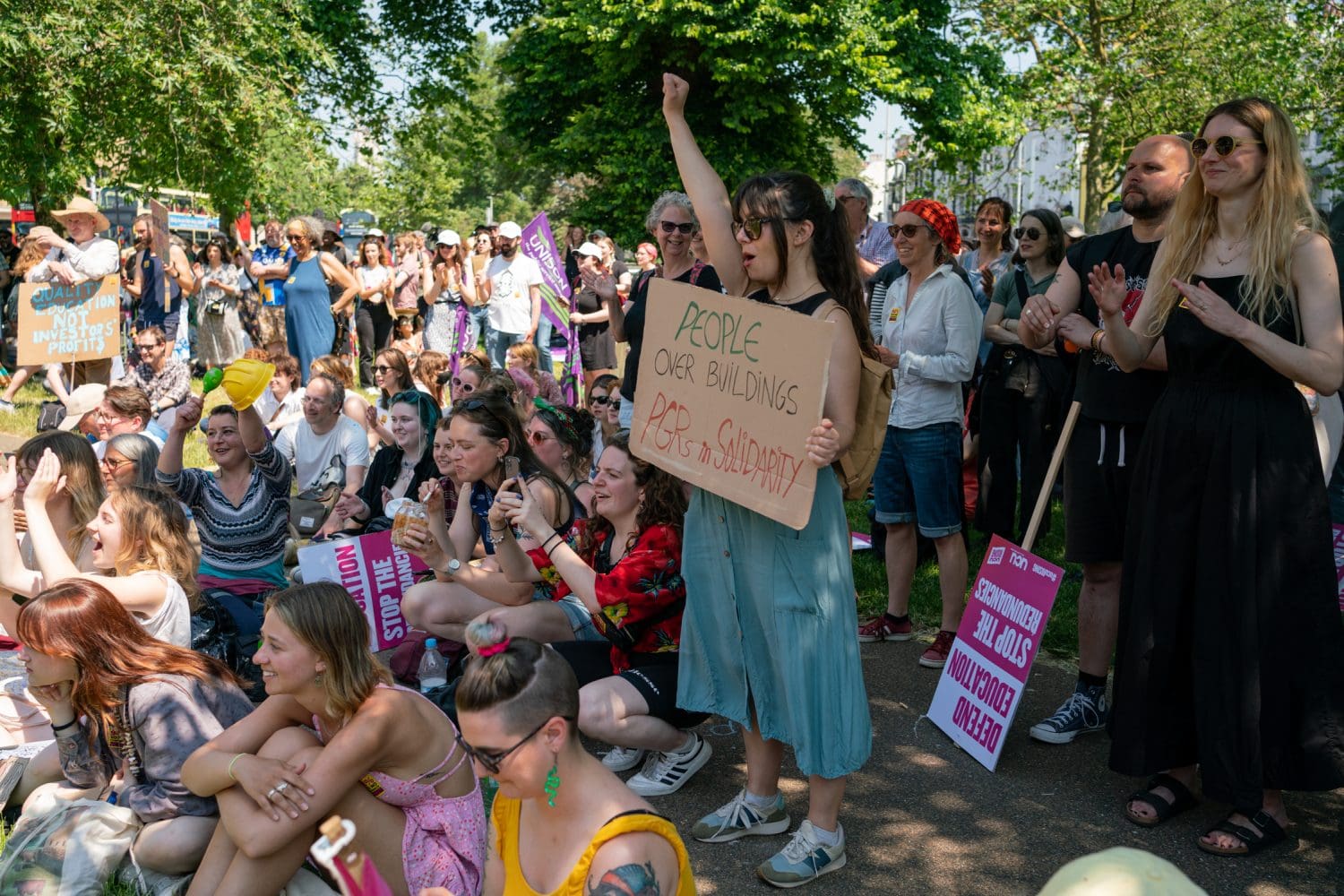
UCU chose this location as it is right outside Grand Parade campus – where an open day was taking place. Conveniently, management had removed all the information about the open day from the university website.
From the estimated 500 people who attended, we had UCU members from as far as Liverpool come down to Brighton:
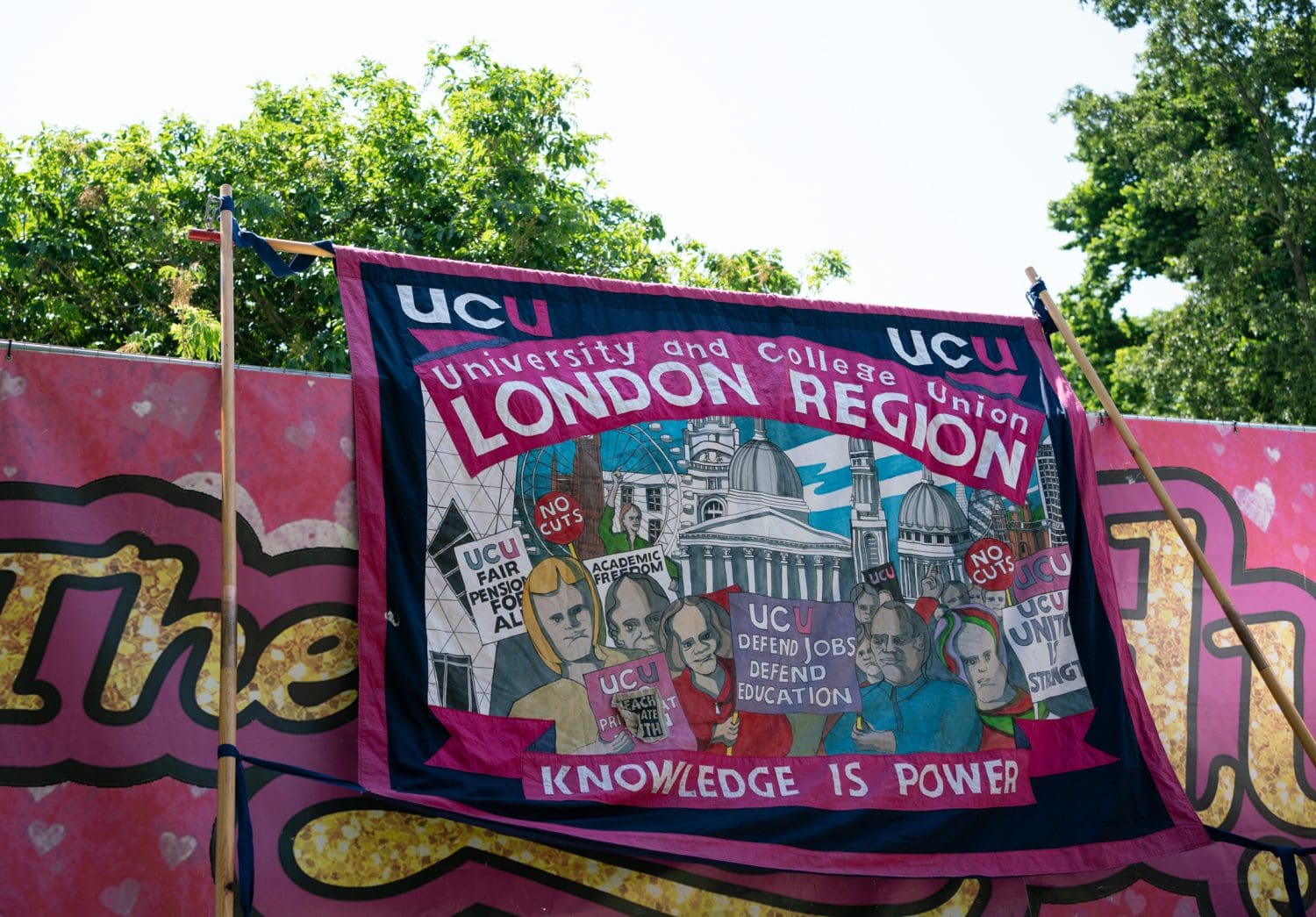
We were also joined by local groups such as Devil’s Dyke Network and Brighton and Hove Green Party. Unite, Green Party MP Caroline Lucas, Labour MP Lloyd Russell-Moyle, and Unison also sent us messages of solidarity and support.
However, while things at the university things continue to deteriorate, similar situations are also emerging elsewhere.
Hammering the arts, again
Since last writing for the Canary, the British and Irish Modern Music Institute (BIMM) in Brighton has also announced a wave of redundancies. Management claims this is due to a ‘restructure in the workforce’. What is interesting about this case is that in 2020, private equity investment firm Immediate Capital Group brought BIMM. Now, management won’t let unions operate there; even if staff unionised, BIMM would not recognise them.
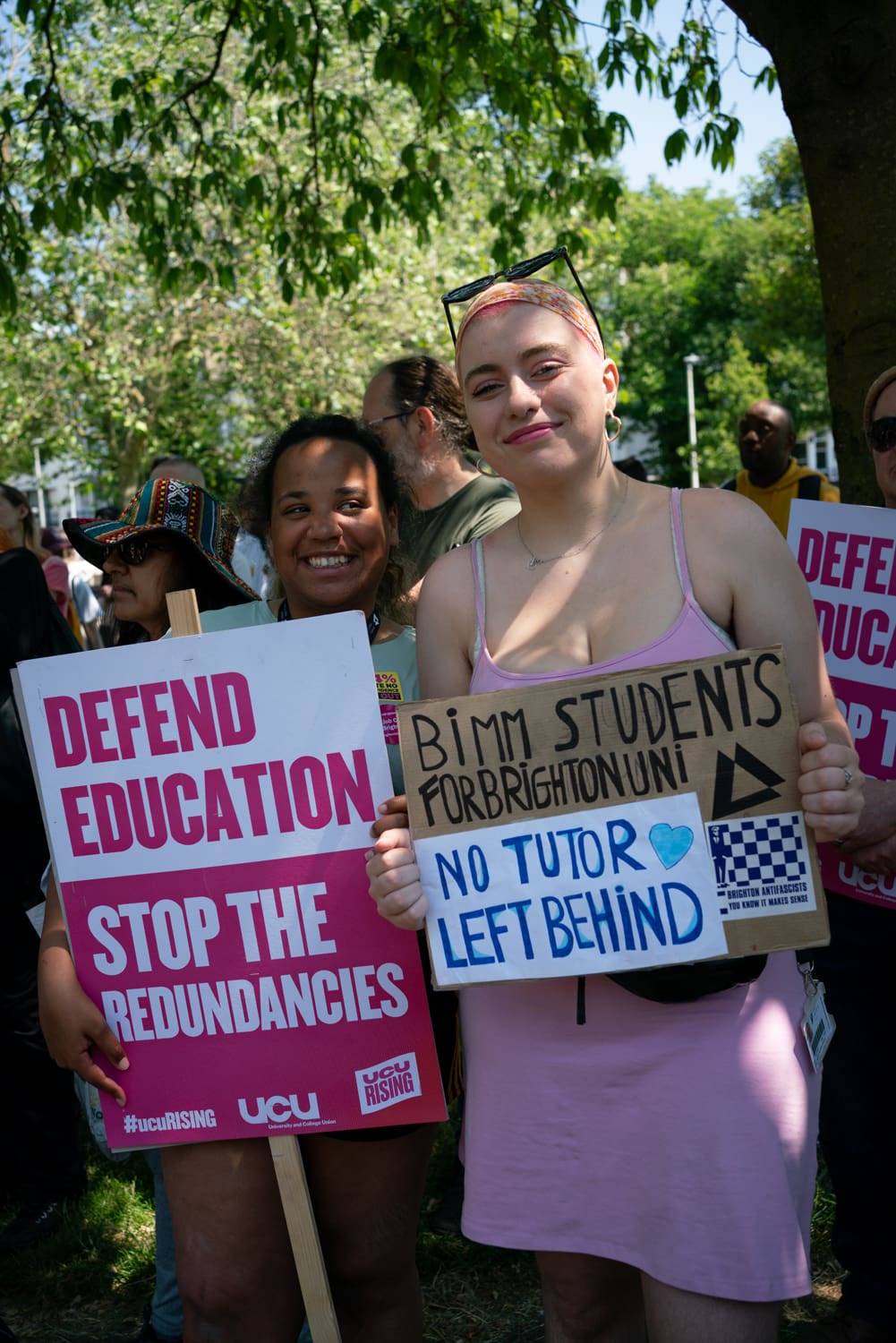
Staff at BIMM are also being denied the right to collectively organise for better working conditions and job security. Stories are now circulating that management is forcing staff to reapply for their own jobs.
Beyond Brighton, the University of East Anglia has announced that 113 staff members are set to lose their jobs in order to make £45m in savings. At the University of Kent, vice chancellor (VC) Karen Cox has ripped up the guarantee that there would be no compulsory redundancies from the arts and humanities department. Management has now placed 52 academics formally ‘at risk’ of compulsory redundancy.
Senior management at war with students and staff
Back in Brighton, our fight against these brutal cuts has brought out the worst in the senior management team.
As I previously reported, security has been hostile and intimidating, which is completely unacceptable in the place where we work and study. Additionally, senior management sought out an injunction against the occupiers of the VC’s office. However, things did not go as management had planned.
Not only was the case adjourned until 9 June but the biggest threat the university threw at the occupiers was removed when the judge placed an arrest block on the case. Unfortunately, as Steve Topple previously reported in the Canary, the occupation ended on 4 June due to a suspiciously timed fire alarm which meant the occupiers had to evacuate the building.
A ‘command-and-control approach’
Senior management has also decided to dock 100% of pay for lecturers participating in the national marking and assessment boycott. These actions are callous. They also make visible management’s disdain for those who work tirelessly to make Brighton University the incredible place it is. One lecturer who wishes to remain anonymous told me:
Brighton University is its staff and students; it is not the buildings, and its certainly not the university’s executive board. These board members, and the university’s senior management, don’t really care about education. They think managing a university is like managing a factory, the staff and students are cogs in a machine to turn out widgets called degrees.
This is why these senior managers, especially since Debra Humphris has been VC, are obsessed with a command-and-control approach to every aspect the university. In essence, everyone’s job – whether administrator, tutor, lecturer, or even Dean of school – is simply to do as their told and keep quiet. But it should be obvious that this approach undermines the agency of staff and schools, which necessarily undermines education.
There are many reasons to charge the university’s management with incompetence (financial, strategic, managerial). But at its heart, their failure lies on the fact that they don’t understand that a university is fundamentally a community of scholars. Our university needs new management now, but its future depends on empowering and building an academic community.
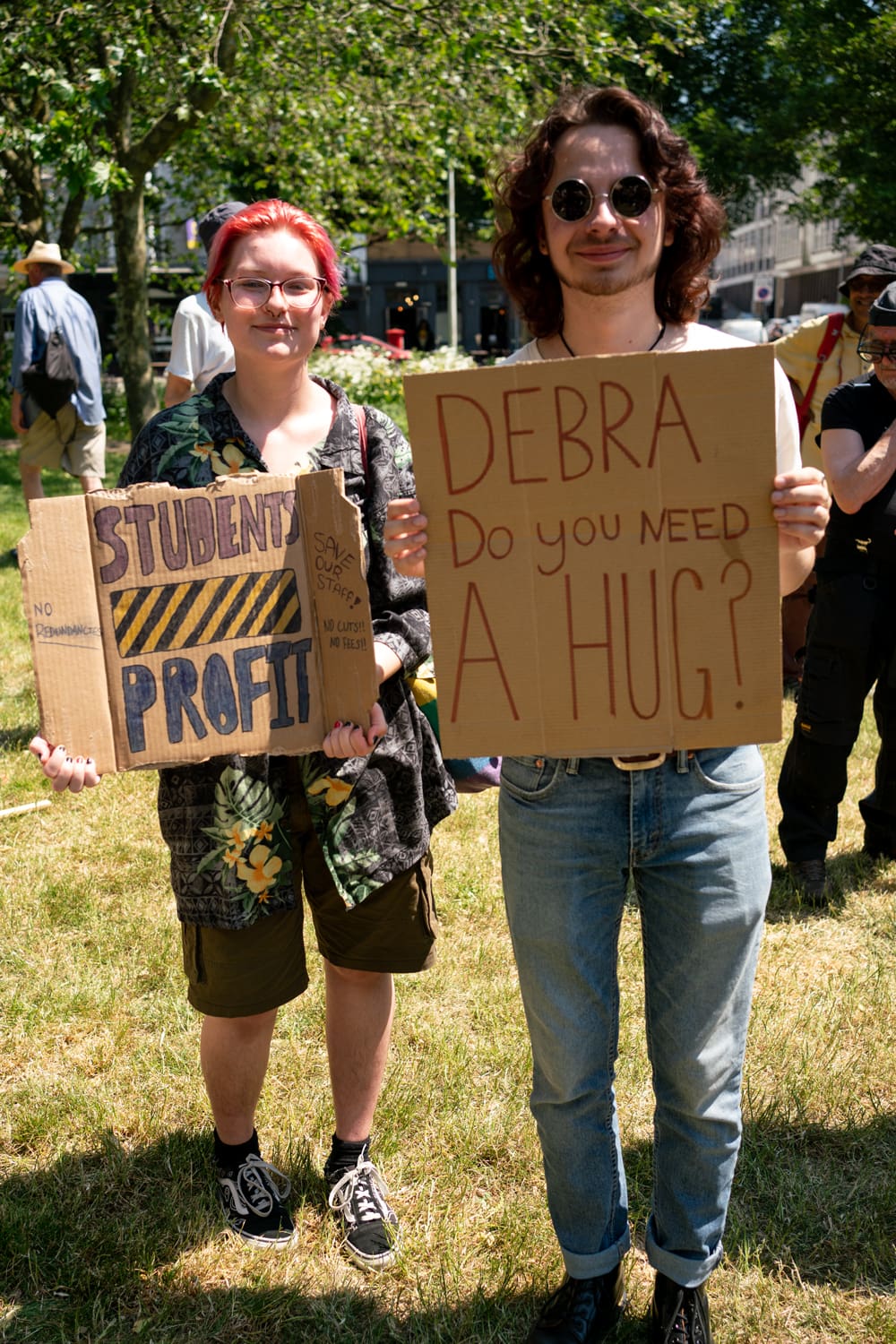
Post-graduate researchers refuse to teach
A key point of contention for many students is that when the initial announcement for mass redundancies occurred, we were assured that ‘student impact would be minimised’. This begs the question of how this could be the case if we lose 110 valued academic staff? These concerns are especially acute for the humanities department, which is on course to lose almost half its faculty.
What is worrying is that university management has not told us any concrete details as to how they intend to minimise this disruption to education. We believe that the university will rely on post-graduate researchers (PGRs) as a cheap source of labour to clean up the mess that they have left from their poor decision-making. Hence, a collective of PGRs, including myself, have pledged not to teach next year.
This is a decision that none of us took lightly. Many of us take on teaching to supplement our research stipends. This is because the cost of living crisis is stretching these even further. Additionally, teaching opportunities are integral to our professional development. However, we refuse to be complicit in the destruction of our academic home.
Management’s ‘vandalism’
Wanda Canton, a PGR at Brighton University told me:
I love teaching, and I rely on it to supplement my PhD stipend which is around 50% of less than the average UK national wage. PhD teachers have much lower wages at Brighton and short, module-specific contracts, often asked to step in at the last minute while delivering the same teaching and marking work as other colleagues.
We believe they will rely on PhD researchers who are on low incomes and developing their professional portfolios to fill in for the mass redundancies of teachers. But the people they are making redundant are our supervisors, our colleagues, and our friends.
We do not want any part in such vandalism against the staff community, and we are certainly not prepared to operate as cheap substitutes, especially as we have been in our own dispute with the university over attempts to reduce our already low pay even further. We are an exploited staff group, but we know our value of our threatened colleagues with whom we stand in solidarity.
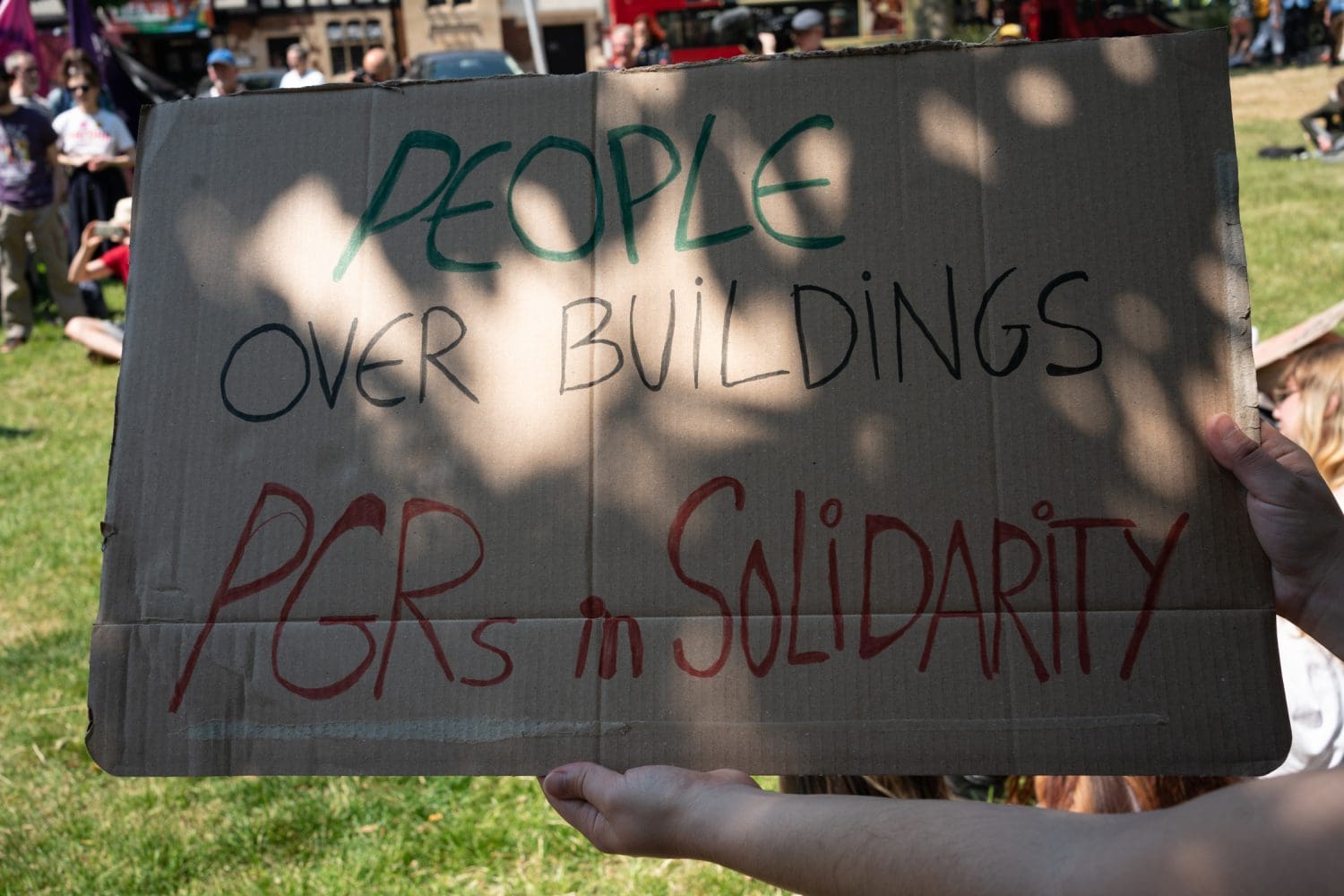
Brighton University: we are still continuing to fight
There has been no shortage of action from everybody affected in opposing these redundancies – as 10 June’s demo showed:
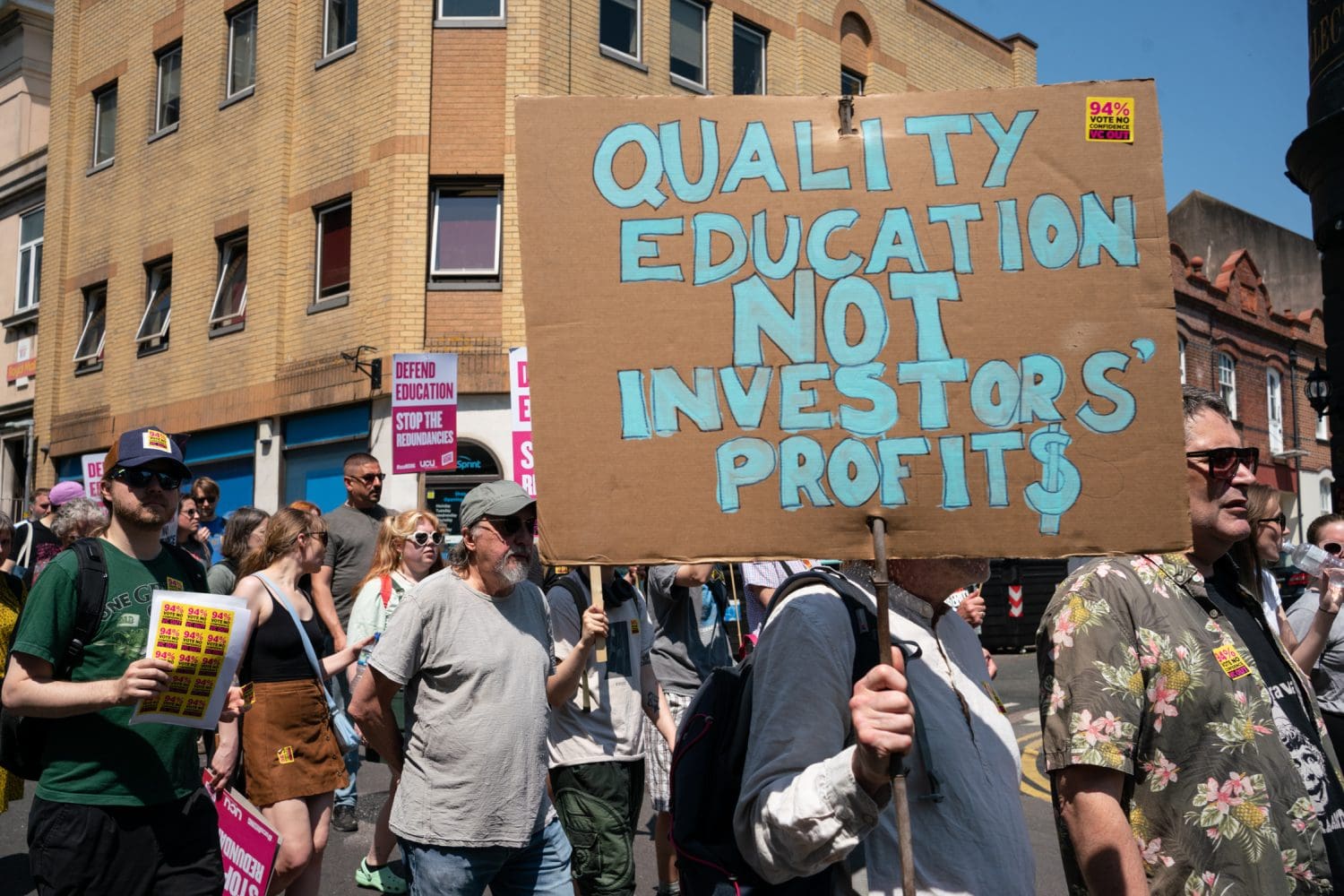
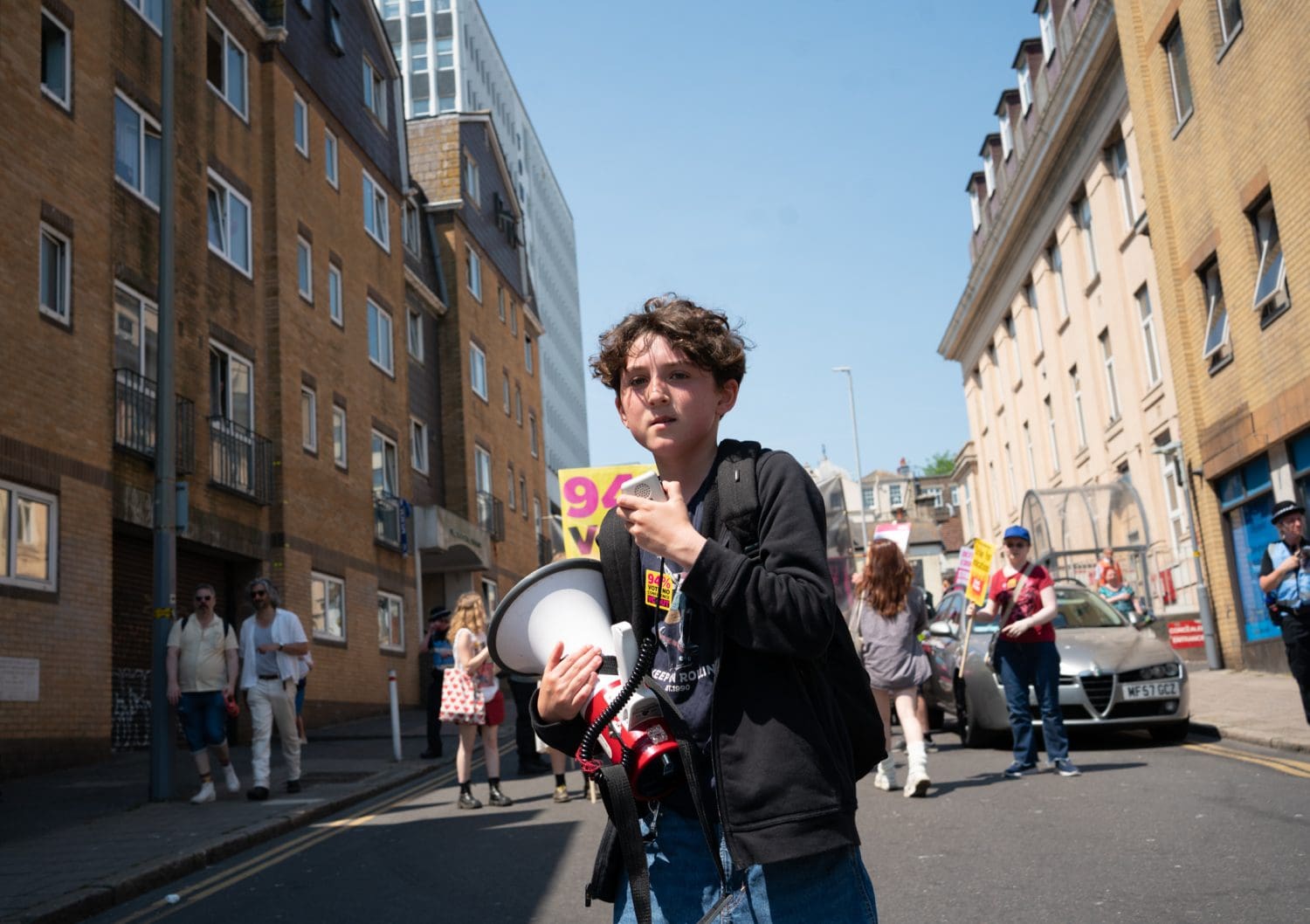

Moreover, in a confidence vote 94% of respondents stated they have no confidence in Humphris or senior management:
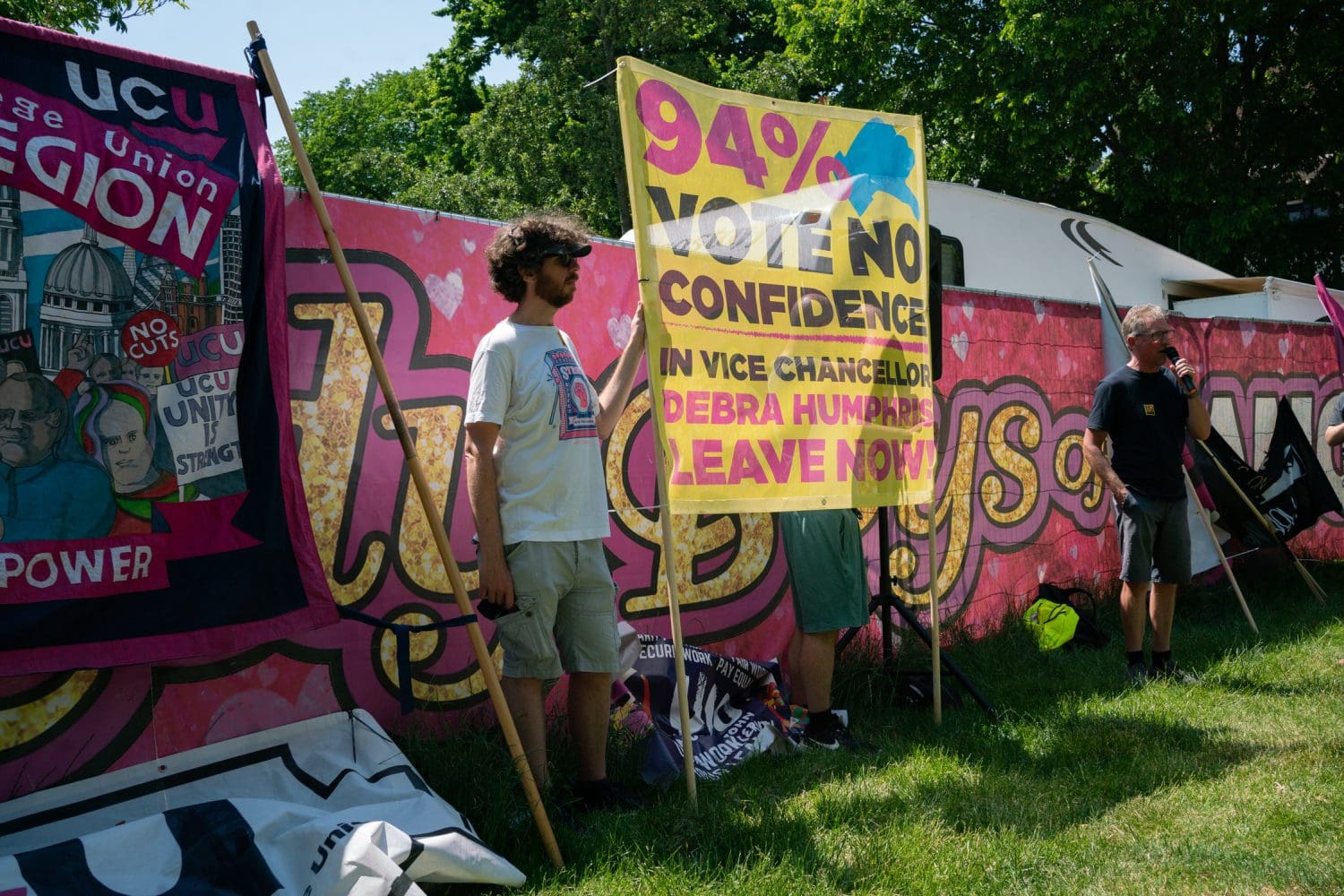
Meanwhile, Brighton Students Union has committed itself to silence on this issue. However, its Sussex counterpart has been an incredible source of solidarity. Not only did they throw a party to help us fundraise, but they delivered an incredible speech at the latest rally. It highlighted the absence of our own student union.
A tweet from @brightonexiles, I believe, perfectly encapsulates the sentiment we’ve witnessed:
The campaign against redundancies is energetic, creative, and mass: with students, workers, artists and supporters all over the world. The best management has been able to do so far is set off a fire alarm and… [stop advertising] an open day. Which would you trust more with [Brighton University’s] future?
Everyone involved in this dispute at Brighton has been deeply moved by the displays of solidarity from across the UK and internationally. This campaign has brought out the best in creativity, resilience, compassion and determination from students and staff. It is these characteristics that make Brighton University the special place that it is.
Featured image and additional images via Kamal Badhey – check out www.kamalbadhey.com or Insta @kamal_badhey
This post was originally published on Canary.